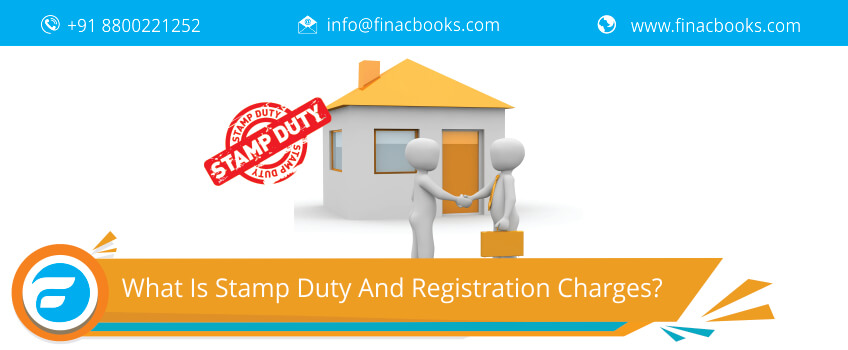Tax Benefit On Stamp Duty And Registration Charges Of a Property
What Is Stamp Duty And Registration Charges?
The ache for home lives in all of us, the safe place where we can go as we are and not be questioned. Buying a house is not only a financial but an emotional investment as well and it is most probably one of the biggest financial decisions you as an individual can make in your entire life and once you decide to buy a house, you have to work on lot of factors like identifying the property, working on the down payment, applying for the loan, signing the sale agreement etc and one of the most important and final step while buying a house is the possession and registration of your property which means the physical transfer of the property in your name.
After you have bought a property the seller has to give you a document stating that the mentioned property is being transferred to you and you have to register your name in the local municipal records against the property in picture and the tax which you pay on property transactions is called stamp duty. Normally stamp duty varies from state to state, value of property and type of property if it is old or new.
Stamp duty is payable under Section 3 of the Indian Stamp Act 1899 and is similar to income tax i.e. stamp duty must be paid in full and on time and can attract penalty if not paid well in time. Stamp duty is a proper legal document and is considered as evidence in courts, provided it is properly stamped. Section 80C covers stamp duty and registration charges and the maximum deduction one can claim is Rs 1.5 lakhs and if your expenses have gone beyond the given threshold amount, the extra amount will not be eligible for deductions under this section.

Stamp duty and registration charges are considered to be one of the heftiest charges borne by an individual while buying a house and to get it transferred in your name wherein stamp duty could be as high as 8% of the property value and registration charge, also known as processing fee, could roughly be approx 1% of the property value so when combined, total of both becomes approx 8-10% of the property value which could be quite a hefty amount. However, that’s where Government steps in and has provided relief in respect of payment of stamp duty and registration charge and the amount and charges paid under stamp duty and registration charges can be claimed as deduction under Section 80C of the Income Tax Act 1961 under below mentioned conditions:
- Only individuals and Hindu Undivided Family (HUF) can claim the deduction of Stamp Duty and Registration Charges.
- You need to have the house possession for a time period of at least 5 years from the purchase or registration date, whichever is later. You need to make sure that you claim the deduction before you start living in the same because you won’t be able to claim the expenses if you have already occupied the house property either completely or partially. The house or the property has to be new.
- Also, you cannot claim the deductions if the property is under construction.
- You can claim the deductions only in the year of actual payment.
- Deductions can be claimed only in the year of actual payment.
- The property or the house must be in the name of the assessee and the expenses of stamp duty and registration charge must be borne by the same and not by any other person.
- Payments done for commercial property is not applicable for deduction under this section.
- If there is more than one owner of the property, then you will be able to claim the deductions under this section as joint owner up to Rs 1.5 lakhs each.
- Any other expenses such as service tax paid for the transfer of the property can also be claimed as deduction under this section i.e. Section 80C.
- Stamp duty or the registration charge for which you are seeking the deduction has to be from previous financial year only i.e. in the FY 2016-17 you can claim deduction for the stamp duty and registration charge paid in the FY 2015-16.
Under Section 80C, following expenses are not eligible for deductions such as:
- Admission fees
- Initial deposit to become a shareholder
- Cost involved in any addition or alteration or renovation or repair of the house which s carried out after the completion certificate has been issued.
Adding Your Spouse As Co-Owner Of Property
Buying a house together has many financial benefits other than the obvious emotional reasons which go hand in hand in making the decision. If experts have to be believed then it always makes more sense to add your spouse as co-owner of the property because it will not only help you in extending your loan eligibility but also helps in availing various tax benefits such as interest and loan repayment. Also, succession of such properties is much easier and smoother than the single owned properties.
Apart from the above mentioned benefits, one of the major benefit one gets from a co-owned property is of stamp duty and registration charges. So if you have made your wife as the first owner of the property, you have saved yourself lot of money towards paying stamp duty and registration charges.
In many states such as New Delhi, stamp duty charges for registration of a property is much lower for women than what it is for men. Stamp duty fees for a man is 6% for a man whereas it is 4% for a woman and thus if you have bought a house under co-ownership you will have to pay stamp duty of 5% only against what you have paid had you bought in your name i.e. 6%. States like Haryana which are constantly working towards women empowerment have special stamp duty fees for women from urban areas and rural areas which is 6% and 4% respectively against stamp duty of 8% and 6% for man from urban and rural areas respectively.
Also having a property jointly with your spouse has a positive effect on loan eligibility as well as on the loan amount because while giving the loan, the financial institutions considers various factors like your income, credit score, your payment record etc and in case you have low income or have a low credit score or payment record, involvement of your spouse as a loan applicant is nothing but the blessing because in this case your spouse income or credit score will be taken into consideration.
For example, if your yearly income of Rs 10 lakhs makes you eligible for a loan up to RS 50 lakhs, however if your spouse also earns Rs 10 lakhs per annum, your chances to get loan up to Rs 1 crore increases considerably. Besides having a positive effect on the loan eligibility and loan amount, having your wife as a co-applicant gets you a concessional interest rate at various financial institutions and it is always advisable for both the joint owners to have equal contribution while buying the property because it will help them in availing capital gain benefits.
How Is Stamp Duty And Registration Charges Paid?
Stamp duty and registration charges is not a due based deduction but a payment based deduction which means that you can claim the deductions if there is actual payment of these expenses and also there should be no due. Also, the stamp duty percentage depends on several factors such as:
One can pay the stamp duty and registration charges through three ways i.e. through non-judicial stamp paper, by using the e-stamping method or by franking method. If you are using non-judicial stamp paper method, complete details of the agreement is mentioned in non-judicial stamp paper and is registered within four months at the sub-registrar’s office duly signed by the executants. In case of franking method, the agreement is printed on plain paper and submitted to an authorized bank which processes the same through franking method. There is third option which is available in not all but few states where you can make the online payment of stamp duty and registration charges through RTGS/NEFT and the stamp duty certificate can be downloaded later for the registration process.














